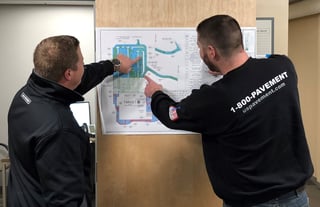Ensuring successful projects by incorporating a "trust but verify" process into your procurement practices
We all have budgets and goals for each project that we manage which requires us to look intimately at the partners we work with. The criteria needed to properly vet a proposal or compare apples to apples requires the customer to really dial into what’s in it for them. Contractor selection can be a touchy subject, but a key to success is to trust but verify.
 Most programs outline the expectations for performance of workmanship and materials selection, but that’s the first part. Verifying that you’re getting what you paid for is a critical element to ensure success of projects and your program overall. Is the contractor providing the proper amount of materials that the bid requires? Will they shut down your store or property and try to do everything in one phase? No contractor can operate in a vacuum –
Most programs outline the expectations for performance of workmanship and materials selection, but that’s the first part. Verifying that you’re getting what you paid for is a critical element to ensure success of projects and your program overall. Is the contractor providing the proper amount of materials that the bid requires? Will they shut down your store or property and try to do everything in one phase? No contractor can operate in a vacuum –
Your sites are operational and must stay open to not effect sales or tenant access. All work must be performed in the context of your sites, with proper communication to ensure impact to your operations is kept to a minimum or eliminated.
These essential measures of a properly executed project do not come into play until well after the project has been awarded. In the world of procurement, with so many competing factors, the low price may not reflect the long-term outcome you were seeking in your capital or maintenance improvement. The final piece to ensuring you get what you paid for is certifying your contractor has the tools and resources in place to deliver these non-scope related requirements: tracking materials installed, coordination efforts, daily project status deliverables, and final verification.
 Your contractor must provide several deliverables – including Daily Reports, Daily Quantity Tracker, Final Quantity Reconciliation Form – to track and verify all project quantities and that specified scopes and depths are delivered on-site. By receiving daily reports, you will be able to track how things are progressing and make necessary adjustments to ensure all specifications are followed. It is critical to have up to date data on the project's progress, goal for completion and any impact to tenants to ensure that everyone is on the same page.
Your contractor must provide several deliverables – including Daily Reports, Daily Quantity Tracker, Final Quantity Reconciliation Form – to track and verify all project quantities and that specified scopes and depths are delivered on-site. By receiving daily reports, you will be able to track how things are progressing and make necessary adjustments to ensure all specifications are followed. It is critical to have up to date data on the project's progress, goal for completion and any impact to tenants to ensure that everyone is on the same page.
The bottom-line is that a contractor’s end of the bargain doesn’t end with the materials and workmanship. Project management, daily reporting, and coordinating within the context of  your site are all part of the “job description” in today’s construction world. The process of selecting the right contractor must have this “all in” approach. By keeping these tips in mind, you can guarantee that your projects and capital expenditure provide the long lasting final product you expect for your investment.
your site are all part of the “job description” in today’s construction world. The process of selecting the right contractor must have this “all in” approach. By keeping these tips in mind, you can guarantee that your projects and capital expenditure provide the long lasting final product you expect for your investment.
Blake Kelly is Director of National Accounts at U.S. Pavement Services and has been with the company since 2012.










